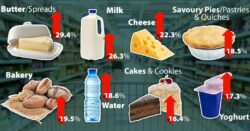The price of butter, milk and cheese went up 30% in just one year at some supermarkets, new figures show.
Overall food and drink inflation across the eight major supermarkets reached 15% in December, but butters and spreads rose by an ‘astonishing’ 29.4%, according to Which?
Milk was 26.3% more expensive than a year before, while cheese (22.3%), bakery items (19.5%), water (18.6%) and savoury pies, pastries and quiches (18.5%) all saw big price bumps.
Among the worst examples of inflation was Utterly Butterly 500g, which nearly doubled from £1 to £1.95 in just three months at certain supermarkets.
Waitrose Duchy Organic Homogenised Semi-Skimmed Milk (1 pint/568ml) jumped 87.1% from 65p to £1.22 over one year, while Creamfields French Brie 200g rose 81.6% from 79p to £1.43 at Tesco.
But the top offender across all supermarkets was Quaker Oat So Simple Simply Apple (8x33g) at Asda, which increased 188% from £1 on average in December 2021 to an average of £2.88 in December 2022.
Consumers are looking for cheaper options amid the cost-of-living crisis, but inflation has been significantly higher on budget supermarket ranges (20.3%) and own-brand items (18.5%). Premium ranges (12.6%) and branded alternatives (12.5%) rose a lot less.
Overall food and drink inflation across the eight major supermarkets reached 15% in the year to December (Picture: Bloomberg/Getty)
Despite being the cheapest supermarket overall, Lidl’s prices went up the most in December (21.1%), followed closely by Aldi (20.8%), according to Which?’s figures.
Asda had the third highest inflation at 15.4%, followed by Waitrose (14.5%), Sainsbury’s (13.7%), Tesco (13.1%), Morrisons (12.9%) and Ocado (10.5%).
Which?’s latest consumer insight survey also shows trust in supermarkets is plummeting, from +67 in May 2021 to +42 now, amid a perception that prices were sometimes artificially inflated.
More: News
Sue Davies, the watchdog’s head of food policy, said: ‘Some households are already skipping meals to make ends meet and our findings show trust in supermarkets taking a hit as many people worry they are putting profits before the people suffering during this cost-of-living crisis.
‘Supermarkets must do more. Which? is calling for them to ensure everyone has easy access to basic, affordable food ranges at a store near them, particularly in areas where people are most in need, as well as pricing which enables people to easily work out best value and promotions to support people who are particularly struggling.’
What do supermarkets have to say for themselves?
A Waitrose spokeswoman said: ‘Which?’s own research released today shows that our price inflation was in fact lower than the market average. We’re working very hard with our suppliers to ensure we offer great value, while continuing to deliver industry-leading animal welfare standards, fresh produce grown with care and fair deals for farmers.’
An Asda spokesman said: ‘We’re working hard to keep prices in check for customers and remain the lowest-priced major supermarket – a position recognised by Which? in their regular monthly basket comparison which has named Asda as the cheapest supermarket for a big shop every month for the last three years.’
An Aldi spokeswoman said: ‘We are the lowest-priced supermarket in Britain. Our customers will always pay less for their shop with Aldi and that is why Which? has named us as the cheapest supermarket in 2022.’
Tesco said: ‘With household budgets under increasing pressure, we are absolutely committed to helping our customers by keeping a laser focus on the cost of the weekly shop. Earlier this week, we were pleased to be recognised by The Grocer as the retailer doing the most to keep prices down right now.’
Get in touch with our news team by emailing us at [email protected].
For more stories like this, check our news page.
Overall food and drink inflation across the eight major supermarkets reached 15% in December, but butters and spreads rose by an ‘astonishing’ 29.4%.





